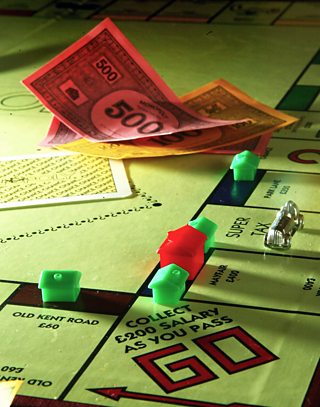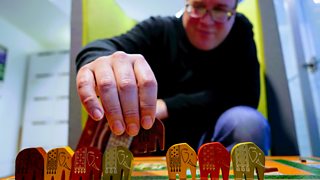Why do we still love playing board games so much?
It's estimated that there are more than 140,000 board games in the world today, with 3,500 created every year. Given the sheer number available, it's perhaps no surprise that the industry is a big player, worth between £8.5 billion and £10 billion a year.
From simple dice rolling and luck-based games like Snakes and Ladders to classics such as Monopoly and more complex modern games like the settlement-building challenge of Catan, there is something for everyone.
For ±«Óãtv Radio 4's All Consuming, marketer and entrepreneur Charlotte Stavrou and science journalist Amit Katwala find out why board games have proved so enduring, how tastes have changed and how they stimulate both competition and co-operation.

The first ever documented board game, Senet, was about the afterlife
Originating between 3,500 BC and 3,100 BC, Senet was played on an ivory board 10 squares long and three squares wide, using pieces that look like chess pawns and stick-like items that served the purpose of a dice. The game was played by the wealthy in Egyptian society and the board was considered a status symbol, one that was important enough to be buried with the owner.
The rules of Senet have been pieced together by historians who see the object of it as players trying to get their pieces across the opposing side, perhaps even with a river boundary to mark safe territory. It has been suggested that the journey of the pieces could have a ritualistic significance, replicating a journey to or through the afterlife, so trying to get to paradise or trying to release the soul.
The game of Mancala was a gateway to adulthood
Thought to have been in existence for almost as long as Senet, Mancala (derived from naqala, the Arabic for 'to move') was created in East Africa before travelling to Europe and then to the Americas via the slave trade.
Both players of Mancala start with a pip containing seeds. The seeds are placed one by one on a board, with the gameplay to capture your opponent’s seeds. Playing the game was seen as a rite of passage into adulthood, one of many examples where participating in board games equates to an idea of social acceptance.

Chess is still the champ
Originally called chaturanga, chess was created in India in the 6th Century before spreading to Persia, the Arab world, the Far East and eventually to Europe in the late medieval period. There are now an estimated 800 million chess players globally; it's quite simply the most popular board game in the world. Not that it needed it, perhaps, but the popularity of the game was given a boost by the Netflix drama The Queen’s Gambit, which caused a worldwide shortage of chess boards in 2021.
Snakes and ladders is a morality tale
The first mass produced board game dates back to the 16 Century, a simple [dice] 'roll and move' game for children called Game of the Goose, very similar to Snakes and Ladders.
Snakes and Ladders has a much longer history than Game of the Goose. It originated in Ancient India and was used by adults to teach children about good and evil. The ladders symbolised reward for good deeds and snakes were there to drag you down for bad acts.
Strategic board games 'make the world a better place'
While there are numerous boardgames, such as Snakes and Ladders, that are purely based on luck, there are plenty that exercise our brainpower too. Classics of this genre include the military domination game of Risk, Catan and Splendor, a card-based board game based on the Renaissance gem trade.
Reiner Knizia, inventor of strategic games El Dorado, Samurai and Lost Cities and known as 'the King of Board games', believes that classic games like Go or Chess "would never be successful today" because of their slow gameplay, at least initially. He believes that people want instant engagement, and one of the ways of doing that is to make boardgames co-operative. One such example is Reiner's Lord of the Rings game. Based on the Tolkien novels, the players of the game, like the characters in the book, have to work together to overcome challenges.
"It's a wonderful experience," says Reiner, "an interactive experience, and it brings people together and I think they make the world a better place."
Monopoly started out as a critique of capitalism… but ended up a celebration of competition
While co-operation might be an attraction for some board game players, competition is still key for others.

Created in 1904 as The Landlord's Game, what became Monopoly was intended to educate players about land value and the inequities of land ownership. Arguably it backfired somewhat to become synonymous with ambition and greed, and right up there with the most argued-over board game between its players.
Certainly, Monopoly's World Champion and stand-up comedian Nicolò Falcone grew up with the game in a highly competitive surrounding, often being goaded by his father and older brother who would shout "destroy your house!" at him when his portfolio crumbled. Clearly it must have made him the champion he is today.
Nicolò’s tip to other aspiring entrepreneurs is to sit tight in jail when the game is finishing and collect rent from the other players. As he puts it, "remember that the prison is an enemy at the beginning of the game and the friend at the end of the game."
Board games make for 'the best night ever'
To explain the enduring allure of board games, the last word goes to one of the customers of board game mecca store Orcs Nest in London, visited by Amit.
"I remember one night there was a thunderstorm and the whole city where I live was without power. I was at my friend's house, and we couldn't go home because it was not safe to get a taxi or an Uber," they recall.
"So we spent the whole night until the sun came out playing board games. It was amazing. It was one of the best nights ever."
To find out more about Amit and Charlotte's board games odyssey, just listen to the episode in full.
The information contained in this article was correct at the time of broadcast on 31 August, 2023.
-
![]()
How to win at Scrabble
±«Óãtv Ideas has five simple tips to make you a wizard at the word game.

More from ±«Óãtv Radio 4
-
![]()
How did tea become the nation's favourite drink?
The contentious story of tea and its place in the British psyche.
-
![]()
Just how healthy are plant-based meat alternatives?
Looking into how good processed vegan, plant-based products are for us.
-
![]()
How did vaping get so popular?
Tracing the history and extraordinary growth of e-cigarettes.
-
![]()
Do Go Pass
Samira Ahmed examines the appeal of board games in an increasingly digital world.






